论语中的名言英语翻译
- 格式:docx
- 大小:20.69 KB
- 文档页数:7
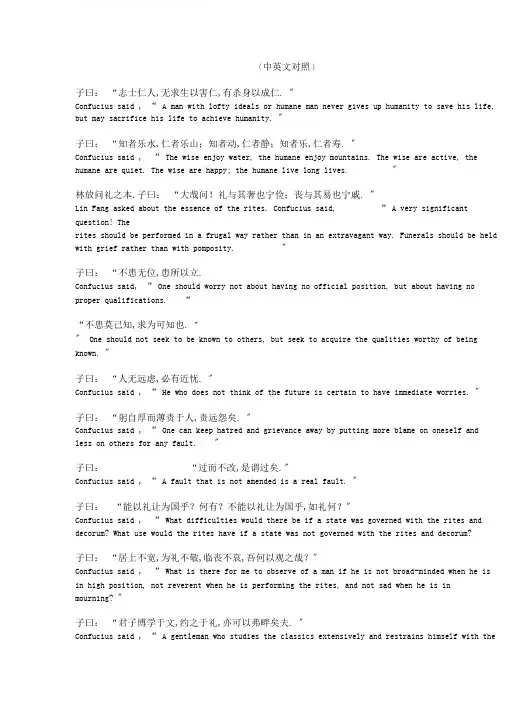
〔中英文对照〕子曰:“志士仁人,无求生以害仁,有杀身以成仁. 〞Confucius said , “ A man with lofty ideals or humane man never gives up humanity to save his life, but may sacrifice his life to achieve humanity. 〞子曰:“知者乐水,仁者乐山;知者动,仁者静;知者乐,仁者寿. 〞Confucius said , “ The wise enjoy water, the humane enjoy mountains. The wise are active, the humane are quiet. The wise are happy; the humane live long lives. 〞林放问礼之本.子曰:“大哉问!礼与其奢也宁俭;丧与其易也宁戚. 〞Lin Fang asked about the essence of the rites. Confucius said, “ A very significant question! Therites should be performed in a frugal way rather than in an extravagant way. Funerals should be held with grief rather than with pomposity. 〞子曰:“不患无位,患所以立.Confucius said, “ One should worry not about having no official position, but about having no proper qualifications. ““不患莫己知,求为可知也. "〞One should not seek to be known to others, but seek to acquire the qualities worthy of being known. 〞子曰:“人无远虑,必有近忧. 〞Confucius said , “ He who does not think of the future is certain to have immediate worries. 〞子曰:“躬自厚而薄责于人,责远怨矣. 〞Confucius said , “ One can keep hatred and grievance away by putting more blame on oneself and less on others for any fault. 〞子曰:“过而不改,是谓过矣. 〞Confucius said , “ A fault that is not amended is a real fault. 〞子曰:“能以礼让为国乎?何有?不能以礼让为国乎,如礼何?〞Confucius said , “ What difficulties would there be if a state was governed with the rites and decorum? What use would the rites have if a state was not governed with the rites and decorum?子曰:“居上不宽,为礼不敬,临丧不哀,吾何以观之哉?〞Confucius said , “ What is there for me to observe of a man if he is not broad-minded when he is in high position, not reverent when he is performing the rites, and not sad when he is in mourning? 〞子曰:“君子博学于文,约之于礼,亦可以弗畔矣夫. 〞Confucius said , “ A gentleman who studies the classics extensively and restrains himself with therites will not depart from the Way.子曰:“弟子入那么孝,出那么弟〞Confucius said , “ Young people should be filial to their parents at home and respectful to their brothers when they are with them. 〞〞谨而信,泛爱众,而亲仁. “〞They should be serious and trustworthy, love the populace extensively and be close to those who are humane. “行有余力,那么以学文. 〞“ When all this is done and there is time for other things, they should use it for the study ofthe classics. 〞子曰:“父母在,不远游,游必有方. 〞Confucius said , “ While one ’ s parents are alive, one should not travel to distant places. If it isnecessary to travel, there should be a definite direction. 〞子曰:“岁寒,然后知松柏之后凋也. 〞Confucius said , “ Only in cold winter does one know that the pine and the cypress are the last to shed their leaves. 〞子曰:“君子喻于义,小人喻于利. 〞Confucius said , “ The gentleman knows what is right; the mean person keeps his mind only on gains."子曰:“君子周而不比,小人比而不周. 〞Confucius said “, The gentleman unites and does not plot with others; the mean man plots and does not unite wi th others. 〞子曰:“君子和而不同,小人同而不和. 〞Confucius said , “ The gentleman aims at harmony, and not at uniformity. The mean man aims at uniformity, and not at harmony. 〞子曰:“德之不修,学之不讲.闻义不能徒,不善不能改,是吾忧也. 〞Confucius said , “ Neglect of moral cultivation, neglect of learning and practicing what has been learned, failure to follow what is right, and failure to correct what is wrong —these are my ___ ・ _ _ 〞worries. 〞子曰:“益有三乐,损有三乐. "Confucius said , “ Three kinds of pleasure are beneficial, and three kinds pleasure are harmful. “乐节礼乐,乐道人之善,乐多贤友,益矣.The pleasure of being regulated by the rites and music, the pleasure of praising other men’ s goodness, and the pleasure of having many virtuous friends are beneficial." 乐骄乐,乐佚游,乐宴乐,损矣. 〞"The pleasure of being conceited, the pleasure of unrestrained wanderings, and the pleasure of indulging in eating and drinking are harmful. 〞子曰:“见贤思齐焉,见不贤而内自省也. 〞Confucius said , “ When one sees a virtuous man, one should think of exerting oneself to be like him; when one sees someone who is not virtuous, one should examine onself. 〞子曰:“学而时习之,不亦说乎?The Master said, To learn and at due times to repeat what one has learnt, is that not after all a pleasure?有朋自远方来,不亦乐乎?That friends should come to one from afar, is this not after all delightful?人不知而不愠,不亦君子乎?〞To remain unsoured even though one ’ s merits are unrecognized by others, is that not after all what is expected of a gentleman?曾子曰:“吾日三省吾身:Master Tseng said, Every day I examine myself on these three points:为人谋而不忠乎?in acting on behalf of others, have I always been loyal to their interests?与朋友交而不信乎?In intercourse with my friends, have I always been true to my word?传不习乎?〞Have I failed to repeat the precepts that have been handed down to me?有子曰:“礼之用,和为贵.先王之道,斯为美,小大由之.Master Yu said, In the usages of ritual it is harmony that is prized; the Way of the Former Kings from this got its beauty. Both small matters and great depend upon it.有所不行,知和而和,不以礼节之,亦不可行也. “If things go amiss, he who knows the harmony will be able to attune them. But if harmony itself is not modulated by ritual, things will still go amiss.子曰:“吾十有五而志于学,三十而立,四十而不惑,The Master said, "At fifteen I set my heart upon learning. At thirty, I had planted my feet firm upon the ground. At forty, I no longer suffered from perplexities.五十而知天命,六十而耳顺,At fifty, I knew what were the biddings of Heaven. At sixty, I heard them with docile ear.七十而从心所欲,不逾矩. 〞At seventy, I could follow the dictates of my own heart; for what I desired no longer overstepped the boundaries of right. 〞子曰:“其身正,不令而行;其身不正,虽令不从. 〞The Master said, “If the ruler himself is upright all will go well even though he does not give orders. But if he himself is not upright, even though he gives orders, they will not be obeyed.子曰:“三人行,必有我师焉.The Master said, “n wEhven walking in a party of no more than three I can always be certain of learning from those I am with.择其善者而从之,其不善者而改之. 〞There will be good qualities that I can select for imitation and bad ones that will teach me what requires correction in myself. 〞子曰:“出门如见大宾,Confucius said , "When you go out of your home, behave as is you were meeting important guests;使民如承大祭.when you are using the common people ’ lasbor, behave as if you were conducting a solemnsacrificial ceremony.己所不欲,勿施于人.在邦无怨,在家无怨. 〞Do not impose on others what you do not desire yourself. Bear no grudge against the state where you work; have no feeling of dissatisfaction when you stay at home. 〞子曰:“刚、毅、木、讷近仁. 〞Confucius said , “ Being firm, resolute, simple and reticent is close to being humane. 〞子曰:“唯仁者能好人,能恶人. 〞Confucius said , “ Only the humane can love others and hate others.〞子曰:“君子坦荡荡,小人长戚戚. 〞Confucius said, “ The gentleman is open and at ease; the mean man is full of worries and anxieties.〞子曰:“无欲速,无见小利.欲速那么不达,见小利那么大事不成. 〞Confucius said , “ Do not want to do things quickly, and do not seek petty gains. You cannot reach your goal if you want to be quick, and you cannot accomplish great things if you seek pettygains.〞子曰:“有教无类. 〞Confucius said , “ There should be education for everyone without distinction. 〞子曰:“性相近也,习相远也. 〞Confucius said , “ By nature men are similar to one another, but learning and practice make them different. 〞子曰:“学而不思那么罔,思而不学那么殆. 〞Confucius said, “ He who learns without thinking will be bewildered; he who thinks without learning will be in danger. 〞子曰:“温故而知新,可以为师矣. 〞Confucius said , “ He can be a teacher who finds what is new in reviewing what is old. 〞子曰:“三军可夺帅也,匹夫不可夺志. 〞Confucius said, “ Any army may be deprived of its commanding officer, yet a man cannot be deprived of his will. 〞子曰:“由,诲女知之乎?知之为知之,不知为不知,是知也. 〞Confucius said , “ You, shall I teach you what it is to know? You know something if you know it, and you do not know something if you do not. That is what to know means. 〞子曰:“君子讷于言而敏于行. 〞Confucius said , “ The gentleman wishes to be slow in speech but quick in action. 〞子曰:“君子耻其言而过其行. 〞Confucius said , “ The gentleman considers it a shame to talk more than he does.〞子曰:“君子不以言举人,不以人废言. 〞Confucius said , “ The gentleman does not recommend a man because of what he says, nor does he ignore what a man says because of his personality.〞子曰:“默而识之,学而不厌,诲人不倦,何有于我哉?〞Confucius said , “ To commit knowledge to memory quietly, to study tirelessly, and to enlighten others indefatigably —these are not difficult for me. 〞子曰:“见义不为,无勇也. 〞Confucius said , “ It is cowardice not to dare to defend righteousness when it is endangered. 〞子曰:“贤哉回也!The Master said, incomparable indeed was Hui!一箪食,一瓢饮,在陋巷A handful of rice to eat, a gourdful of water to drink, living in a mean street.人不堪其忧,回也不改其乐.贤哉回也!〞Others would have found it unendurably depressing, but to Hui ’ scheerfulness it made no difference at all. Incomparable indeed was Hui!子曰;〞巧言令色,鲜矣也. “The Maser said, “ find words and insinuating appearance are seldom associated with true virtue.子曰:〞逝者如斯夫,不舍昼夜. “The Maser said, “ It passes on just like this, not ceasing day or night! 〞非礼勿视,非礼勿听,非礼勿言,非礼勿动.Look not at what is contrary to propriety; listen not to what is contrary to propriety; speak not what is contrary to propriety; make no movement which is contrary to propriety.唯女子与小人,为难养也.近之那么不孙,远之那么怨.Of all people, girls and servants are the most difficult to behave to. If you are familiar with them, they lose their humility. If you maintain a reserve towards them, they are discontented.关睢乐而不淫,哀而不伤.The Kwan Tsu is expressive of enjoyment without being licentious, and of grief without being hurtfully excessive.诗三百,一言以蔽之,曰:思无邪.In the Book of Poetry are three hundred pieces, but the design of them all may be embraced in one sentence-- "Having no depraved thoughts."不患人之不己知,患不知人也.I will not be afflicted at men's not knowing me; I will be afflicted that I do not know men.父在,观其志.父没,观其行.三年无改于父之道,可谓孝矣.While a man's father is alive, look at the bent of his will; when his father is dead, look at his conduct. If for three years he does not alter from the way of his father, he may be called filial.后生可畏,焉知来者之不如今也?A youth is to be regarded with respect. How do you know that his future will not be equal to our present?君子以文会友,以友辅仁.The superior man on grounds of culture meets with his friends, and by their friendship helps his virtue.言必信,行必果.Keep what you say and carry out what you do.知者不惑,仁者不忧,勇者不惧.The wise are free from perplexities; the virtuous from anxiety; and the bold from fear.君子成人之美,不成人之恶,小人反是.The superior man seeks to perfect the admirable qualities of men, and does not seek to perfect their bad qualities. The mean man does the opposite of this.何以报德?以直报怨,以德报德.With what then will you recompense kindness? Recompense injury with justice, and recompense kindness with kindness.巧言乱德.小不忍,那么乱大谋.Specious words confound virtue. Want of forbearance in small matters confounds great plans.道不同,不相为谋.Those whose courses are different cannot lay plans for one another.。
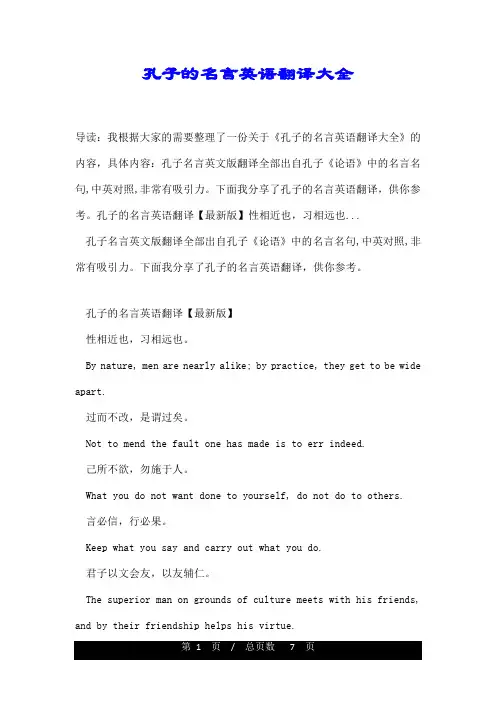
孔子的名言英语翻译大全导读:我根据大家的需要整理了一份关于《孔子的名言英语翻译大全》的内容,具体内容:孔子名言英文版翻译全部出自孔子《论语》中的名言名句,中英对照,非常有吸引力。
下面我分享了孔子的名言英语翻译,供你参考。
孔子的名言英语翻译【最新版】性相近也,习相远也...孔子名言英文版翻译全部出自孔子《论语》中的名言名句,中英对照,非常有吸引力。
下面我分享了孔子的名言英语翻译,供你参考。
孔子的名言英语翻译【最新版】性相近也,习相远也。
By nature, men are nearly alike; by practice, they get to be wide apart.过而不改,是谓过矣。
Not to mend the fault one has made is to err indeed.己所不欲,勿施于人。
What you do not want done to yourself, do not do to others.言必信,行必果。
Keep what you say and carry out what you do.君子以文会友,以友辅仁。
The superior man on grounds of culture meets with his friends, and by their friendship helps his virtue.三军可夺师也,匹夫不可夺志也。
The commander of the forces of a large State may be carried off, but the will of even a common man cannot be taken from him.后生可畏,焉知来者之不如今也?A youth is to be regarded with respect. How do you know that his future will not be equal to our present?有朋自远方来,不亦乐乎?Is it not delightful to have friends coming from distant quarters?人不知而不愠,不亦君子乎?Is he not a man of complete virtue, who feels no discomposure though men may take no note of him?父在,观其志。
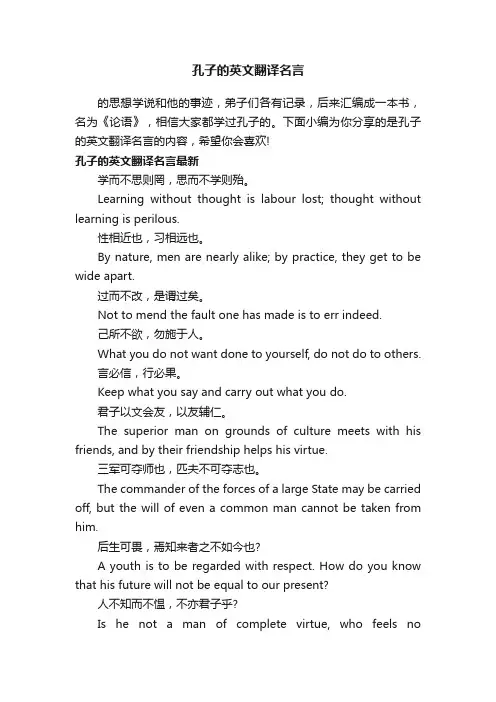
孔子的英文翻译名言的思想学说和他的事迹,弟子们各有记录,后来汇编成一本书,名为《论语》,相信大家都学过孔子的。
下面小编为你分享的是孔子的英文翻译名言的内容,希望你会喜欢!孔子的英文翻译名言最新学而不思则罔,思而不学则殆。
Learning without thought is labour lost; thought without learning is perilous.性相近也,习相远也。
By nature, men are nearly alike; by practice, they get to be wide apart.过而不改,是谓过矣。
Not to mend the fault one has made is to err indeed.己所不欲,勿施于人。
What you do not want done to yourself, do not do to others.言必信,行必果。
Keep what you say and carry out what you do.君子以文会友,以友辅仁。
The superior man on grounds of culture meets with his friends, and by their friendship helps his virtue.三军可夺师也,匹夫不可夺志也。
The commander of the forces of a large State may be carried off, but the will of even a common man cannot be taken from him.后生可畏,焉知来者之不如今也?A youth is to be regarded with respect. How do you know that his future will not be equal to our present?人不知而不愠,不亦君子乎?Is he not a man of complete virtue, who feels nodiscomposure though men may take no note of him?父在,观其志。
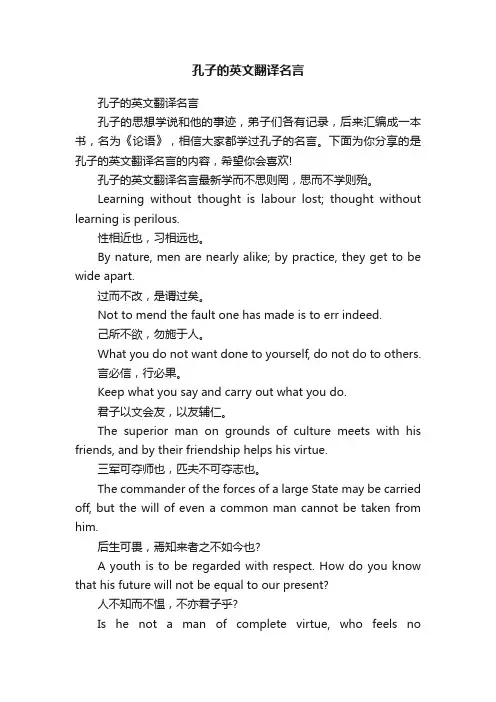
孔子的英文翻译名言孔子的英文翻译名言孔子的思想学说和他的事迹,弟子们各有记录,后来汇编成一本书,名为《论语》,相信大家都学过孔子的名言。
下面为你分享的是孔子的英文翻译名言的内容,希望你会喜欢!孔子的英文翻译名言最新学而不思则罔,思而不学则殆。
Learning without thought is labour lost; thought without learning is perilous.性相近也,习相远也。
By nature, men are nearly alike; by practice, they get to be wide apart.过而不改,是谓过矣。
Not to mend the fault one has made is to err indeed.己所不欲,勿施于人。
What you do not want done to yourself, do not do to others.言必信,行必果。
Keep what you say and carry out what you do.君子以文会友,以友辅仁。
The superior man on grounds of culture meets with his friends, and by their friendship helps his virtue.三军可夺师也,匹夫不可夺志也。
The commander of the forces of a large State may be carried off, but the will of even a common man cannot be taken from him.后生可畏,焉知来者之不如今也?A youth is to be regarded with respect. How do you know that his future will not be equal to our present?人不知而不愠,不亦君子乎?Is he not a man of complete virtue, who feels nodiscomposure though men may take no note of him?父在,观其志。
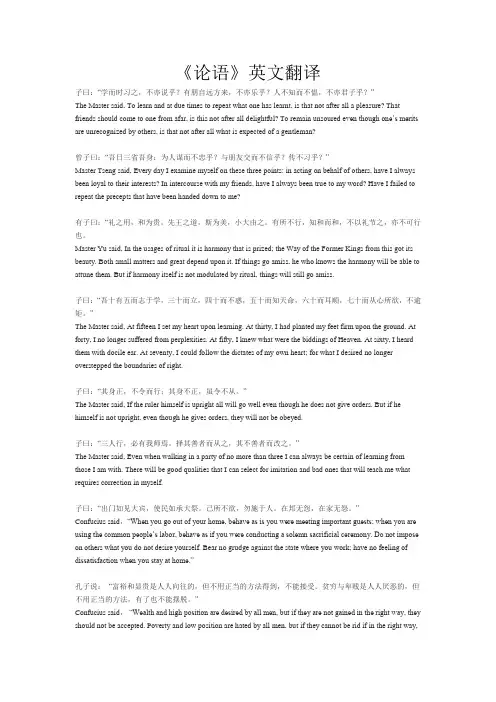
《论语》英文翻译子曰:“学而时习之,不亦说乎?有朋自远方来,不亦乐乎?人不知而不愠,不亦君子乎?”The Master said, To learn and at due times to repeat what one has learnt, is that not after all a pleasure? That friends should come to one from afar, is this not after all delightful? To remain unsoured e ven though one’s merits are unrecognized by others, is that not after all what is expected of a gentleman?曾子曰:“吾日三省吾身:为人谋而不忠乎?与朋友交而不信乎?传不习乎?”Master Tseng said, Every day I examine myself on these three points: in acting on behalf of others, have I always been loyal to their interests? In intercourse with my friends, have I always been true to my word? Have I failed to repeat the precepts that have been handed down to me?有子曰:“礼之用,和为贵。
先王之道,斯为美,小大由之。
有所不行,知和而和,不以礼节之,亦不可行也。
Master Yu said, In the usages of ritual it is harmony that is prized; the Way of the Former Kings from this got its beauty. Both small matters and great depend upon it. If things go amiss, he who knows the harmony will be able to attune them. But if harmony itself is not modulated by ritual, things will still go amiss.子曰:“吾十有五而志于学,三十而立,四十而不惑,五十而知天命,六十而耳顺,七十而从心所欲,不逾矩。
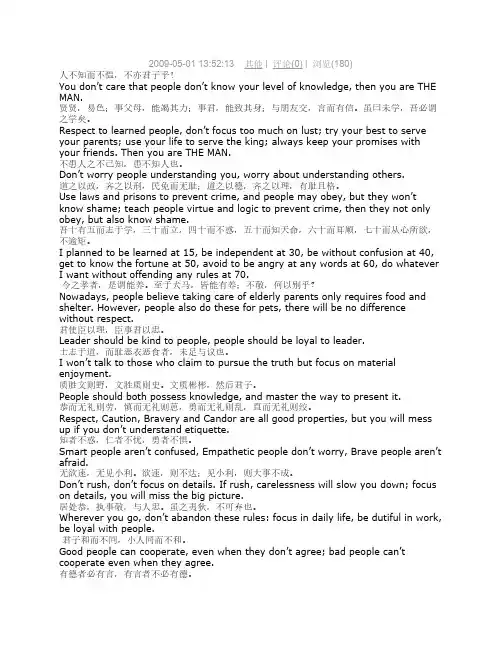
2009-05-01 13:52:13 其他 | 评论(0) | 浏览(180)人不知而不愠,不亦君子乎!You don’t care that people don’t know your level of knowledge, then you are THE MAN.贤贤,易色;事父母,能竭其力;事君,能致其身;与朋友交,言而有信。
虽曰未学,吾必谓之学矣。
Respect to learned people, don’t focus too much on lust; try your best to serve your parents; use your life to serve the king; always keep your promises with your friends. Then you are THE MAN.不患人之不己知,患不知人也。
Don’t worry people understanding you, worry about understanding others.道之以政,齐之以刑,民免而无耻;道之以德,齐之以理,有耻且格。
Use laws and prisons to prevent crime, and people may obey, but they won’t know shame; teach people virtue and logic to prevent crime, then they not only obey, but also know shame.吾十有五而志于学,三十而立,四十而不惑,五十而知天命,六十而耳顺,七十而从心所欲,不逾矩。
I planned to be learned at 15, be independent at 30, be without confusion at 40, get to know the fortune at 50, avoid to be angry at any words at 60, do whatever I want without offending any rules at 70.今之孝者,是谓能养。
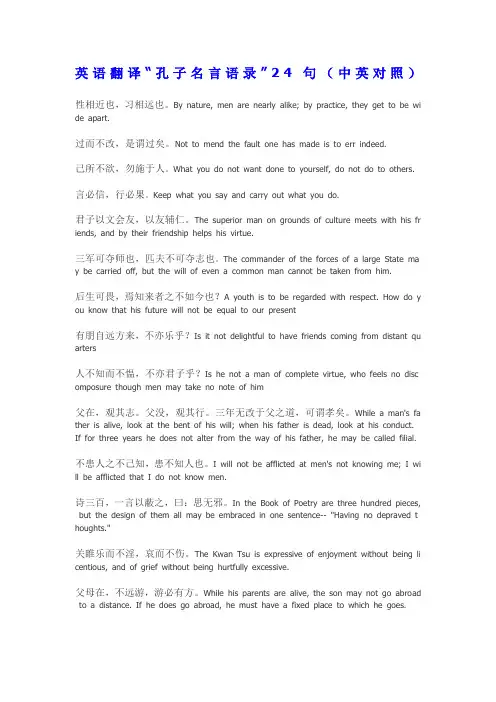
英语翻译“孔子名言语录”24句(中英对照)性相近也,习相远也。
By nature, men are nearly alike; by practice, they get to be wi de apart.过而不改,是谓过矣。
Not to mend the fault one has made is to err indeed.己所不欲,勿施于人。
What you do not want done to yourself, do not do to others. 言必信,行必果。
Keep what you say and carry out what you do.君子以文会友,以友辅仁。
The superior man on grounds of culture meets with his fr iends, and by their friendship helps his virtue.三军可夺师也,匹夫不可夺志也。
The commander of the forces of a large State ma y be carried off, but the will of even a common man cannot be taken from him.后生可畏,焉知来者之不如今也?A youth is to be regarded with respect. How do y ou know that his future will not be equal to our present有朋自远方来,不亦乐乎?Is it not delightful to have friends coming from distant qu arters人不知而不愠,不亦君子乎?Is he not a man of complete virtue, who feels no disc omposure though men may take no note of him父在,观其志。
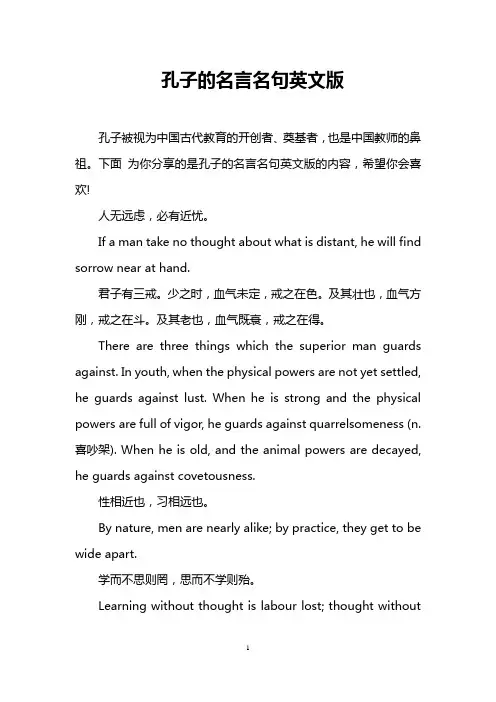
孔子的名言名句英文版孔子被视为中国古代教育的开创者、奠基者,也是中国教师的鼻祖。
下面为你分享的是孔子的名言名句英文版的内容,希望你会喜欢!人无远虑,必有近忧。
If a man take no thought about what is distant, he will find sorrow near at hand.君子有三戒。
少之时,血气未定,戒之在色。
及其壮也,血气方刚,戒之在斗。
及其老也,血气既衰,戒之在得。
There are three things which the superior man guards against. In youth, when the physical powers are not yet settled, he guards against lust. When he is strong and the physical powers are full of vigor, he guards against quarrelsomeness (n. 喜吵架). When he is old, and the animal powers are decayed, he guards against covetousness.性相近也,习相远也。
By nature, men are nearly alike; by practice, they get to be wide apart.学而不思则罔,思而不学则殆。
Learning without thought is labour lost; thought withoutlearning is perilous.性相近也,习相远也。
By nature, men are nearly alike; by practice, they get to be wide apart.后生可畏,焉知来者之不如今也?A youth is to be regarded with respect. How do you know that his future will not be equal to our present?人不知而不愠,不亦君子乎?Is he not a man of complete virtue, who feels no discomposure though men may take no note of him?父在,观其志。
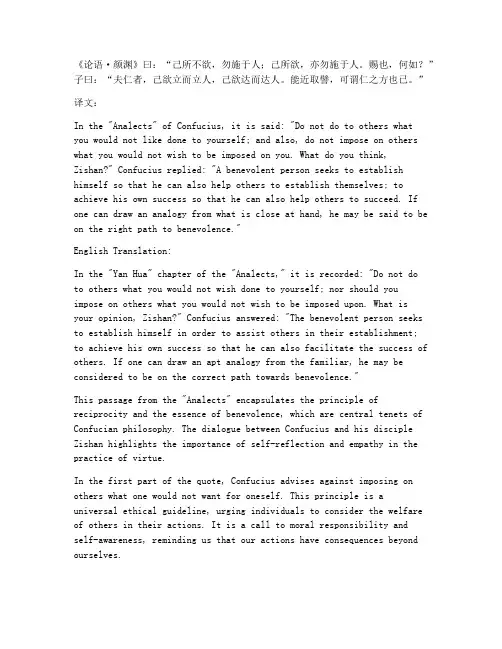
《论语·颜渊》曰:“己所不欲,勿施于人;己所欲,亦勿施于人。
赐也,何如?”子曰:“夫仁者,己欲立而立人,己欲达而达人。
能近取譬,可谓仁之方也已。
”译文:In the "Analects" of Confucius, it is said: "Do not do to others whatyou would not like done to yourself; and also, do not impose on others what you would not wish to be imposed on you. What do you think, Zishan?" Confucius replied: "A benevolent person seeks to establish himself so that he can also help others to establish themselves; to achieve his own success so that he can also help others to succeed. If one can draw an analogy from what is close at hand, he may be said to be on the right path to benevolence."English Translation:In the "Yan Hua" chapter of the "Analects," it is recorded: "Do not doto others what you would not wish done to yourself; nor should you impose on others what you would not wish to be imposed upon. What isyour opinion, Zishan?" Confucius answered: "The benevolent person seeks to establish himself in order to assist others in their establishment;to achieve his own success so that he can also facilitate the success of others. If one can draw an apt analogy from the familiar, he may be considered to be on the correct path towards benevolence."This passage from the "Analects" encapsulates the principle ofreciprocity and the essence of benevolence, which are central tenets of Confucian philosophy. The dialogue between Confucius and his disciple Zishan highlights the importance of self-reflection and empathy in the practice of virtue.In the first part of the quote, Confucius advises against imposing on others what one would not want for oneself. This principle is auniversal ethical guideline, urging individuals to consider the welfare of others in their actions. It is a call to moral responsibility andself-awareness, reminding us that our actions have consequences beyond ourselves.The second part of the quote delves into the concept of benevolence, or "ren" in Chinese. Confucius describes the benevolent person as one who seeks not only his own success but also the success of others. This idea is profound, as it emphasizes the interconnectedness of human beings and the importance of altruism. The benevolent person is not merely concerned with personal gain but is motivated by a desire to contribute to the well-being of the community.Confucius further illustrates the path to benevolence by suggesting the use of analogy. By drawing parallels between one's own experiences and the experiences of others, one can better understand the needs and desires of others. This approach encourages empathy and fosters a deeper connection between individuals, leading to a more harmonious and compassionate society.The English translation of this passage aims to convey the wisdom and depth of the original text. It seeks to capture the essence of Confucian philosophy and present it in a way that is accessible to English-speaking audiences. The translation aims to preserve the original meaning while adapting the language to suit the contemporary reader.In conclusion, the passage from the "Analects" offers a timeless message about the importance of ethical conduct and the cultivation of benevolence. It serves as a reminder that our actions have the power to impact not only ourselves but also those around us. By practicing empathy, self-reflection, and the principle of reciprocity, we can contribute to a more harmonious and compassionate world.。
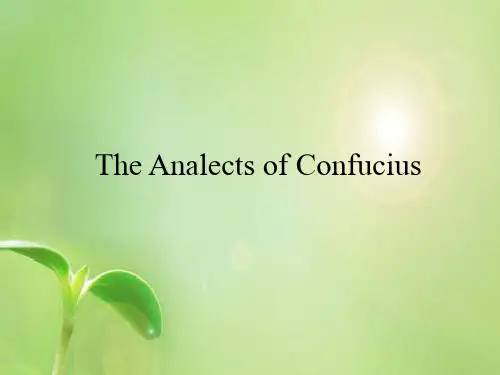
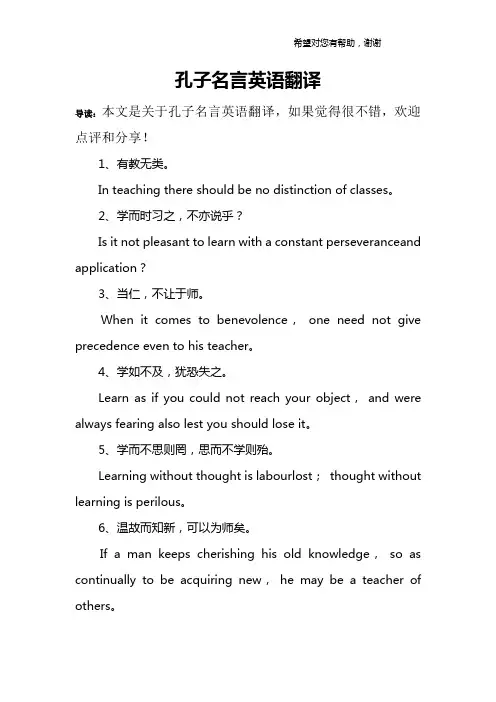
孔子名言英语翻译导读:本文是关于孔子名言英语翻译,如果觉得很不错,欢迎点评和分享!1、有教无类。
In teaching there should be no distinction of classes。
2、学而时习之,不亦说乎?Is it not pleasant to learn with a constant perseveranceand application?3、当仁,不让于师。
When it comes to benevolence,one need not give precedence even to his teacher。
4、学如不及,犹恐失之。
Learn as if you could not reach your object,and were always fearing also lest you should lose it。
5、学而不思则罔,思而不学则殆。
Learning without thought is labourlost;thought without learning is perilous。
6、温故而知新,可以为师矣。
If a man keeps cherishing his old knowledge,so as continually to be acquiring new,he may be a teacher of others。
7、敏而好学,不耻下问。
He was of an active nature and yet fond of learning,and he was not ashamed to ask and learn of his inferiors。
8、知之者,不如好之者,好之者,不如乐之者。
They who know the truth are not equal to those who love it,and they who love it are not equal to those who delight in it。
(完整word版)《论语》选段翻译(中英文对照)《论语》选段翻译(中英文对照)子曰:“志士仁人,无求生以害仁,有杀身以成仁。
”Confucius said,“A man with lofty ideals or humane man never gives up humanity to save his life, but may sacrifice his life to achieve humanity.”子曰:“知者乐水,仁者乐山;知者动,仁者静;知者乐,仁者寿。
”Confucius said,“The wise enjoy water, the humane enjoy mountains. The wise are active, the humane are quiet. The wise are happy; the humane live long lives. ”林放问礼之本。
子曰:“大哉问!礼与其奢也宁俭;丧与其易也宁戚。
”Lin Fang asked about the essence of the rites. Confucius said, “A very significant question! The rites should be performed in a frugal way rather than in an extravagant way. Funerals should be held with grief rather than with pomposity.”子曰:“不患无位,患所以立。
Confucius said,“One should worry not about having no official position, but about having no prope r qualifications. ““不患莫己知,求为可知也。
"”One should not seek to be known to others, but seek to acquire the qualities worthy of being known.”子曰:“人无远虑,必有近忧。
《论语》选段翻译(中英文对照)子曰:“志士仁人,无求生以害仁,有杀身以成仁。
”Confucius said,“A man with lofty ideals or humane man never gives up humanity to save his life,but may sacrifice his life to achieve humanity。
”子曰:“知者乐水,仁者乐山;知者动,仁者静;知者乐,仁者寿."Confucius said,“The wise enjoy water,the humane enjoy mountains. The wise are active, the humane are quiet。
The wise are happy;the humane live long lives。
”林放问礼之本.子曰:“大哉问!礼与其奢也宁俭;丧与其易也宁戚。
”Lin Fang asked about the essence of the rites。
Confucius said, “A very significant question!The rites should be performed in a frugal way rather than in an extravagant way。
Funerals should be held with grief rather than with pomposity。
"子曰:“不患无位,患所以立.Confucius said,“One should worry not about having no official position,but about having no prope r qualifications. ““不患莫己知,求为可知也。
”"One should not seek to be known to others, but seek to acquire the qualities worthy of being known.”子曰:“人无远虑,必有近忧."Confucius said,“He who does not think of the future is certain to have immediate worries."子曰:“躬自厚而薄责于人,责远怨矣."Confucius said,“One can keep hatred and grievance away by putting more blame on oneself and less on others for any fault。
孔子名言名句英语导读:本文是关于孔子名言名句英语的文章,如果觉得很不错,欢迎点评和分享!1、学而时习之,不亦说乎?Is it true to learn from time to time?2、德不孤,必有邻。
Virtue is not alone, there must be neighbors.3、当仁,不让于师。
Dang Ren, don't give in to the teacher.4、学而不思则罔,思而不学则殆。
Learning without thinking is useless, thinking without learning is perilous.5、知者乐水,仁者乐山。
知者动,仁者静。
知者乐,仁者寿。
Knowledgeable people like water, benevolent people like mountain. Knowledgeable people move, benevolent people quiet. He who knows is happy, but he who is benevolent is longevity.6、温故而知新,可以为师矣。
He who by reviewing the old can gain knowledge of the new and is fit to be a teacher.7、有教无类。
Make no social distinctions in teaching.8、十室之邑,必有忠信,如丘者焉,不如丘之好学也。
There must be faithfulness in a ten-chamber city. It is not as good as learning in a hill.9、言必信,行必果。
Words must be believed and deeds must bear fruit.10、父母在,不远游,游必有方。
《论语》中的名言名句与翻译(最新版)编制人:__________________审核人:__________________审批人:__________________编制单位:__________________编制时间:____年____月____日序言下载提示:该文档是本店铺精心编制而成的,希望大家下载后,能够帮助大家解决实际问题。
文档下载后可定制修改,请根据实际需要进行调整和使用,谢谢!并且,本店铺为大家提供各种类型的经典范文,如唐诗宋词、古文名句、古诗试题、古人列传、作文大全、小说阅读、散文阅读、励志名言、好词好句、其他范文等等,想了解不同范文格式和写法,敬请关注!Download tips: This document is carefully compiled by this editor.I hope that after you download it, it can help you solve practical problems. The document can be customized and modified after downloading, please adjust and use it according to actual needs, thank you!In addition, this shop provides you with various types of classic sample essays, such as Tang poems and Song poems, ancient famous sentences, ancient poetry test questions, ancient biographies, composition books, novel reading, prose reading, inspirational quotes, good words and good sentences, other sample essays, etc. Learn about the different formats and writing styles of sample essays, so stay tuned!《论语》中的名言名句与翻译论语名句1、学而时习之,不亦说乎?有朋自远方来,不亦乐乎?译文:学习知识而又能经常去复习、练习,不也是很令人高兴的事么?有朋友远道而来,不也是令人快乐的事么?2、吾日三省吾身:为人谋而不忠乎?与朋友交而不信乎?传不习乎?译文:我每天多次地进行自我反省:为别人办事竭尽全力了吗?和朋友交往免诚实守信吗?老师传授知识,是否用心认真地复习?3、巧言令色,鲜矣仁!译文:花言巧语、假装和善的脸色,这样的人很少有仁德的!4、君子务本,本立而道生。
《论语》十则英文翻译子曰:“学而时习之,不亦说乎?有朋自远方来,不亦乐乎?人不知而不愠,不亦君子乎?”The Master said, To learn and at due times to repeat what one has learnt, is that not after all a pleasure? That friends should come to one from afar, is this not after all delightful? To remain unsoured even though one’s merits are unrecognized by others, is that not after all what is expected of a gentleman?曾子曰:“吾日三省吾身:为人谋而不忠乎?与朋友交而不信乎?传不习乎?”Master Tseng said, Every day I examine myself on these three points: in acting on behalf of others, have I always been loyal to their interests? In intercourse with my friends, have I always been true to my word? Have I failed to repeat the preceptsthat have been handed down to me?有子曰:“礼之用,和为贵。
先王之道,斯为美,小大由之。
有所不行,知和而和,不以礼节之,亦不可行也。
Master Yu said, In the usages of ritual it is harmony that is prized; the Way of the Former Kings from this got its beauty. Both small matters and great depend upon it. If things go amiss, he who knows the harmony will be able to attune them. But if harmony itself is not modulated by ritual, things will still go amiss.子曰:“吾十有五而志于学,三十而立,四十而不惑,五十而知天命,六十而耳顺,七十而从心所欲,不逾矩。
论语中的名言英语翻译 今天为你分享的是论语中的名言英语翻译的内容,希望你会喜欢!论语中的名言英语翻译(精选篇)1.有朋自远方来,不亦乐乎?1)Howhappyweare,Tomeetfriendsfromafar.2)Isn’t it a plesure to meet friends from distant places?2.己所不欲,勿施于人。 1)Don’timposeonotherswhatyoudon’tdesire.2)Do not do onto others what you don’t want to be done to yourself.3.学而时习之,不亦说乎?Isn’t it a pleasure to study and practice what you have learned?4.学而不思则罔, 思而不学则殆。 To study and not think is a waste. To think and not study is dangerous.5.温故而知新,可以为师矣。 Reviewing what you have learned and learning anew, you are fit to be a teacher.6.欲速则不达。 More haste, less speed.7.人无远虑,必有近忧。 He who does not care about the future is sure to have oncoming worries.8.过而不改,是谓过矣!Knowing that you have made a mistake but not correcting it is a real mistake.9.三人行必有我师。 Among three people, there must be one who can be my teacher.10.其身正,不令而行。 Set a good example, and others will follow.论语中的名言英语翻译(经典篇)性相近也,习相远也。 By nature, men are nearly alike; by practice, they get to be wide apart.过而不改,是谓过矣。 Not to mend the fault one has made is to err indeed.己所不欲,勿施于人。 What you do not want done to yourself, do not do to others.言必信,行必果。 Keep what you say and carry out what you do.君子以文会友,以友辅仁。 The superior man on grounds of culture meets with his friends, and by their friendship helps his virtue.三军可夺师也,匹夫不可夺志也。 The commander of the forces of a large State may be carried off, but the will of even a common man cannot be taken from him.后生可畏,焉知来者之不如今也?A youth is to be regarded with respect. How do you know that his future will not be equal to our present?有朋自远方来,不亦乐乎? Is it not delightful to have friends coming from distant quarters?人不知而不愠,不亦君子乎?Is he not a man of complete virtue, who feels no discomposure though men may take no note of him?父在,观其志。 父没,观其行。 三年无改于父之道,可谓孝矣。 While a man's father is alive, look at the bent of his will; when his father is dead, look at his conduct. If for three years he does not alter from the way of his father, he may be called filial.不患人之不己知,患不知人也。 I will not be afflicted at men's not knowing me; I will be afflicted that I do not know men.诗三百,一言以蔽之,曰:思无邪。 In the Book of Poetry are three hundred pieces, but the design of them all may be embraced in one sentence-- "Having no depraved thoughts."关睢乐而不淫,哀而不伤。 The Kwan Tsu is expressive of enjoyment without being licentious, and of grief without being hurtfully excessive.父母在,不远游,游必有方。 While his parents are alive, the son may not go abroad to a distance. If he does go abroad, he must have a fixed place to which he goes.德不孤,必有邻。 Virtue is not left to stand alone. He who practises it will have neighbors.吾十有五而志于学,三十而立,四十而不惑,五十而知天命,六十而耳顺,七十而从心所欲,不逾矩。 At fifteen I set my heart upon learning. At thirty, I planted my feet firm upon the ground. At forty, I no longer suffered from perplexities. At fifty, I knew what were the biddings of Heaven. At sixty, I heard them with docile ear. At seventy, I could follow the dictates of my own heart; for what I desired no longer overstepped the boundaries of right.贤哉回也!一箪食,一瓢饮,在陋巷,人不堪其忧,回也不改其乐。 贤哉回也! Incomparable indeed was Hui! A handful of rice to eat, a gourdful of water to drink, living in a mean street. Others would have found it unendurably depressing, but to Hui's cheerfulness it made no difference at all. Incomparable indeed was Hui.知者乐水,仁者乐山。 知者动,仁者静。 知者乐,仁者寿。 The wise find pleasure in water; the virtuous find pleasure in hills. The wise are active; the virtuous are tranquil. The wise are joyful; the virtuous are long-lived.逝者如斯夫,不舍昼夜。 It passes on just like this, not ceasing day or night!食不厌精,脍不厌细。 He did not dislike to have his rice finely cleaned, nor to have his minced meat cut quite small.非礼勿视,非礼勿听,非礼勿言,非礼勿动。 Look not at what is contrary to propriety; listen not to what is contrary to propriety; speak not what is contrary to propriety; make no movement which is contrary to propriety.人无远虑,必有近忧。 If a man take no thought about what is distant, he will find sorrow near at hand.君子有三戒。 少之时,血气未定,戒之在色。 及其壮也,血气方刚,戒之在斗。 及其老也,血气既衰,戒之在得。 There are three things which the superior man guards against. In youth, when the physical powers, are not yet settled, he guards against lust. When he is strong and the physical powers are full of vigor, he guards against quarrelsomeness. When he is old, and the animal powers are decayed, he guards against covetousness.唯女子与小人,为难养也。 近之则不孙,远之则怨。 Of all people, girls and servants are the most difficult to behave to. If you are familiar with them, they lose their humility. If you maintain a reserve towards them, they are discontented. 5、不患人之不己知,患不知人也。 6、《诗》三百,一言以蔽之,曰:"思无邪。 "7、吾十有五而志于学,三十而立,四十不惑,五十而知天命,六十而耳顺,七十而从心所欲,不逾矩。 8、温故而知新,可以为师矣。 9、学而不思则罔,思而不学则殆。 10、知之为知之,不知为不知,是知也。 11、举直错诸枉,则-民服;举枉错诸直,则-民不服。 12、八佾舞于庭,是可忍也,孰不可忍也!13、成事不说,遂事不谏,既往不咎。 14、子谓《韶>>:"尽美矣,又尽善也。 "谓《武》:"尽美矣,未尽善也。 "15、朝闻道,夕死可矣。